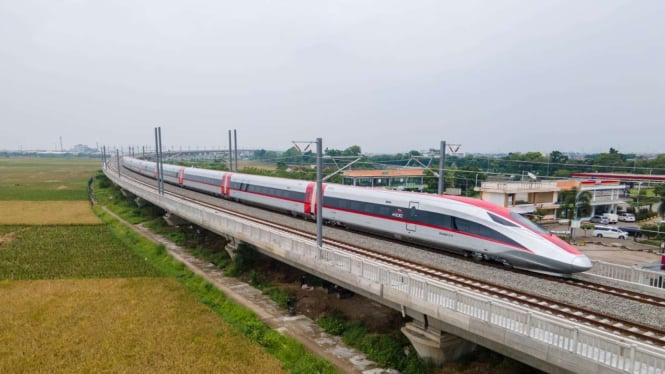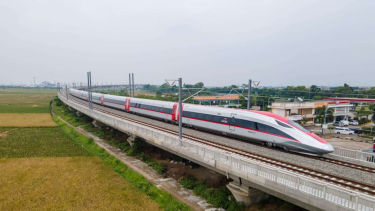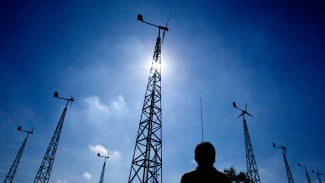KCIC Plans to Increase the Speed of Jakarta-Bandung Fast Train
- Dok. PT KCIC.
VIVA – Kereta Cepat Indonesia China (KCIC) stated that the testing rate of the Jakarta-Bandung High-Speed Train (KCJB) will be increased gradually. Where the peak technical speed is 385 km/hour.
This is based on the implementation of testing and commissioning, KCIC reported that the travel time between Halim Station (East Jakarta) to Tegalluar Station (Bandung Regency) is around 50 minutes.
The President Director of KCIC, Dwiyana Slamet Riyadi said that the first phase of the speed test using the comprehensive inspection train (CIT) has been increased from the previous average of 60 km/hour to 180 km/hour.
He explained that the increase in speed could finally be carried out after all initial preparations for testing and commissioning were successfully completed.
"The testing of the readiness of KCJB infrastructure facilities carried out previously has run smoothly. Based on the evaluation, starting Monday, the speed of the high-speed train began to be increased to up to 180 km/h," Riyadi stated on Tuesday.
Direktur Utama KCIC, Dwiyana Slamet.
- M Yudha P/VIVA.co.id
He ensured that the speed of the high-speed train will continue to be increased until it reaches the peak operational speed of 350 km/h, even until it reaches the peak technical speed of 385 km/h. To achieve this figure, CIT operations will continue to be increased every day.
CIT trips are focused on testing the integration of infrastructure and facilities systems. All aspects will also be checked, whether the function is normal and can be passed by KCJB at high speed. One set of CIT or KCJB inspection trains consists of eight trains.
The functions of the various trains consist of train one for track testing needs, train two for checking signaling and communication systems, and train three for overhead catenary system (OCS) functions.
Next, trains four and seven are for workspaces, train five serves as restoration, train six is a meeting room, and train eight is for signaling functions and checking rail-wheel integration.
"Testing and commissioning of the KCJB will continue to be carried out by KCIC together with independent contractors and consultants. The speed will continue to be gradually increased to ensure that all facilities and infrastructure built are ready for operation," he said.
Meanwhile, Deputy Minister of SOE II, Kartika Wirjoatmodjo said all aspects of the test this time went smoothly. According to him, all systems are functioning properly such as trains, rails, signaling, electricity, and others.
"Gradually, the speed of the test trip will be increased until it reaches its peak technical speed of 385 km/h. To achieve this, improvements in several aspects such as safety fences and sound barriers need to be made. This is so as not to disturb the comfort of the public when KCJB passes," Wirjoatmodjo said.





















